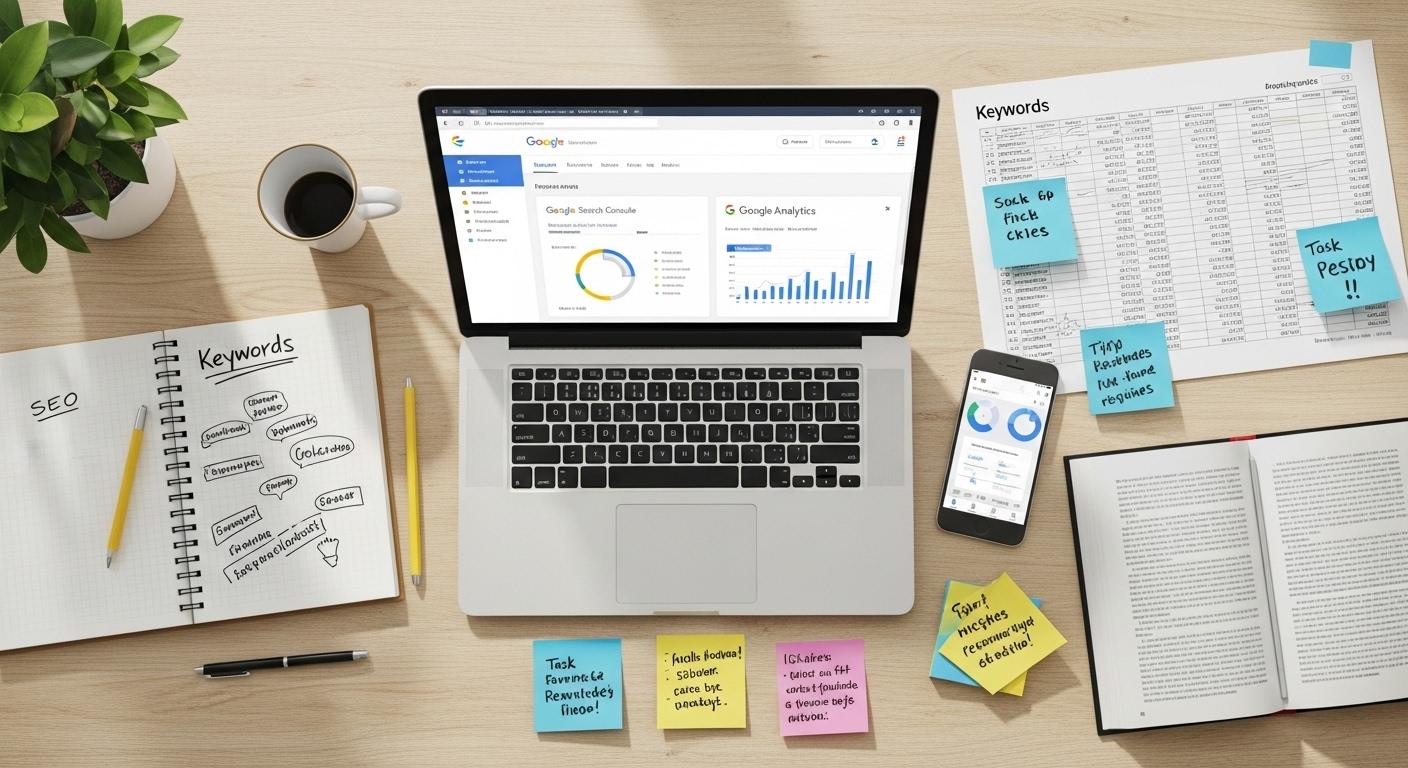
Many website owners think they need expensive agencies to rank well in Google, but that's not true. You can achieve real results by learning how to do SEO yourself. While SEO may seem complex at first, the core concepts are straightforward, and thousands of small business owners have improved their search rankings without professional help.
The question "Can I do my own SEO?" comes up often, and the answer is yes. SEO (Search Engine Optimization) makes your website more visible in search results, so when someone searches for what you offer, proper SEO helps your site rank higher — bringing more visitors, leads, and sales.
Learning to do it yourself SEO gives you control over your online presence. You'll understand what drives traffic to your site, spot opportunities competitors miss, and make smart decisions about your digital strategy without relying on agencies that charge thousands per month.
This guide breaks down the SEO process into simple, actionable steps. You'll learn exactly how to do your own SEO the right way, covering keyword research, on-page optimization, technical fixes, content creation, and link building. By the end, you'll have a clear roadmap to grow your website's visibility through consistent effort.
Understanding the Basics Before You Start Your DIY SEO Journey
Search engine optimization do it yourself starts with understanding what SEO actually means. SEO makes your website appealing to both search engines and real people, as Google uses complex algorithms to decide which pages rank for searches. Your goal is to signal that your content is relevant and valuable.
SEO has four main pillars:
- Keywords: The terms people type into search engines
- On-page optimization: How you structure content and HTML elements
- Backlinks: Links from other websites pointing to yours
- User experience: Site speed, navigation, and mobile performance
These elements work together — you can't focus on just one. Great content paired with slow loading speeds will struggle to rank, while a fast website with poor content won't keep visitors engaged.
Many beginners worry they lack technical skills, but most SEO tasks are accessible to anyone willing to learn. You don't need programming knowledge; you need patience, consistency, and the willingness to test and adjust your approach.
Set realistic goals and understand that SEO takes time — you won't rank first overnight, and results might take three to six months. This timeline shouldn't discourage you, because once your efforts gain traction, the benefits compound, and traffic continues to flow long after you've done the initial work.
When you do SEO yourself, you learn what actually works for your business. You'll recognize patterns, better understand your audience, and develop knowledge that becomes a permanent asset.
Setting the Right Foundation: Tools and Setup for Doing SEO Yourself
Before starting SEO work, you need the right tools. Many excellent tools are free or affordable, so you don't need expensive software for how to do SEO on your own.
Essential free tools:
- Google Search Console: Shows how your site appears in search results, reveals which keywords drive traffic, identifies technical issues, and takes only 15 minutes to set up
- Google Analytics: Tracks visitor behavior, shows how many people visit and which pages they view, and helps measure whether SEO efforts increase traffic
- Google Keyword Planner: Shows search volumes and competition levels (free with a Google Ads account)
- Google PageSpeed Insights: Tests loading speed and Core Web Vitals, which are metrics that affect rankings
Affordable paid options:
- Ubersuggest offers a free tier with limited daily searches
- AnswerThePublic generates question-based keyword ideas
- Screaming Frog crawls up to 500 URLs free
- MozBar browser extension shows domain authority scores
Start with Google Search Console and Google Analytics today — these two tools provide 80% of the data you need. Once they collect data, add other tools as needed without overwhelming yourself with too many platforms at once.
Browser extensions can speed up analysis. SEO Meta in 1 Click displays meta tags instantly, helping you understand why certain pages rank well.
Step-by-Step SEO Strategy: How to Do Your Own SEO the Right Way

Effective how to do SEO yourself strategies follow a logical sequence — skipping steps wastes time. Here's the proven process that works:
- Keyword Research: Identify what people search for in your niche by brainstorming topics, then use keyword tools to find phrases with 100–500+ monthly searches. Focus on long-tail keywords like "best natural soap for eczema" and track keywords in a spreadsheet to guide your content strategy.
- On-Page Optimization: Include your main keyword in title tags (under 60 characters) and meta descriptions (150–160 characters). Structure content with H1, H2, and H3 headings using keyword variations, write valuable content (800–1,000+ words), and naturally include your main keyword 2–4 times throughout.
- Internal Linking: Connect related pages using descriptive anchor text like "natural soap ingredients." Internal links help search engines understand your site structure and distribute authority across pages.
- Technical SEO Checks: Ensure fast page loads (under 3 seconds), mobile-friendliness, no broken links, a proper XML sitemap, and an SSL certificate. These factors allow search engines to crawl and rank your site efficiently.
- Content Creation and Updates: Publish fresh content regularly (at least twice a month) and update older pages to keep information current. Consistent, quality content attracts traffic and improves rankings over time.
DIY SEO Content Optimization Tips That Actually Work
Content quality determines SEO success more than any other factor, as Google recognizes helpful content versus keyword-stuffed fluff. If you're wondering whether you can do SEO yourself through content alone, focus on these proven strategies.
Start by understanding search intent — every keyword represents a question or need. Someone searching "how to make soap at home" wants a tutorial, while someone searching "buy organic soap online" is ready to purchase. Match your content format to what searchers expect.
Write first, then optimize second. Draft content that thoroughly answers the topic, then add keywords where they naturally fit. Forced keyword insertion makes content awkward and hurts readability.
Content optimization checklist:
- Use keyword variations and related terms throughout your content
- Structure content for easy scanning with short paragraphs
- Use descriptive subheadings every 200-300 words
- Add bullet points for lists to improve readability
- Answer questions directly in the first paragraph
- Include images with descriptive file names
- Link to authoritative external sources
- Avoid duplicate content across pages
- Write at least 800 words per post for comprehensive coverage
Featured snippets come from content that answers questions upfront, so put clear answers in the first paragraph and then elaborate with supporting details.
Local SEO and Link Building: Expanding Your DIY SEO Strategy
For businesses serving local customers, ranking in local search is crucial. How to do SEO yourself? Start with your Google Business Profile by claiming your listing, verifying ownership, and completing all details — name, address, phone, website, hours, and high-quality photos.
Maintain NAP (Name, Address, Phone) consistency across all platforms, including your website, social media, and directories, to avoid confusing search engines. Encourage customer reviews and respond professionally to all feedback, whether positive or negative. Create location-specific content for each area you serve by incorporating neighborhood names and local landmarks naturally into your pages.
Submit your business to reputable local directories and chamber of commerce sites to build valuable citations that strengthen your local presence.
Link building strengthens your site's authority over time. Beginner-friendly link-building strategies include:
- Guest posting on relevant industry blogs
- Creating linkable assets like comprehensive guides or original research
- Broken link building by offering your content as a replacement for dead links
- Submitting to relevant, high-quality directories
Avoid buying links or using black-hat tactics, which can seriously harm your rankings. Monitor your backlinks regularly using Google Search Console and disavow harmful links when necessary.
Consistent local SEO efforts combined with ethical link building help small businesses compete with larger competitors, improve visibility in their target markets, and build lasting authority — making them ideal strategies for effective SEO do it yourself.
Measuring Success: How to Know Your DIY SEO Is Working
Tracking results is essential to determine whether your DIY SEO efforts are paying off. Focus on these key performance indicators (KPIs):
- Organic traffic: Use Google Analytics to monitor monthly visitors from search engines and look for upward trends over time rather than day-to-day fluctuations.
- Keyword rankings: Google Search Console shows which keywords drive traffic and their average positions. Improvements like moving from position 15 to 8 signal real progress.
- Click-through rates (CTR): If pages rank well but receive few clicks, adjust your titles and meta descriptions. Position 1 typically gets 28–32% CTR, so lower rates suggest optimization opportunities.
- Page performance and engagement: Identify your top-performing pages and monitor metrics like bounce rate, session duration, and pages per session. High engagement often correlates with better rankings over time.
- Conversions: Track how organic traffic drives sales, leads, or other business goals to measure the real impact on your bottom line.
Remember that doing SEO myself requires patience. Results are gradual, and a post may take several months to reach its full ranking potential. However, with consistent effort and regular monitoring, DIY SEO can deliver sustainable traffic growth, improved rankings, and measurable business results that compound over time.
learn with mettevo
view blog


Are You Ready To Grow Your Website?
Understanding the ins and outs of website growth, we help ensure that your site grows over time with ever-increasing reach and accessibility. Not only do we employ the latest digital marketing techniques for driving traffic directly to your website, but our strategies also focus on gaining loyalty from those visitors so they come back again and again.
Leave your contacts to get a comprehensive and aggressive digital marketing plan taking your business to new heights.